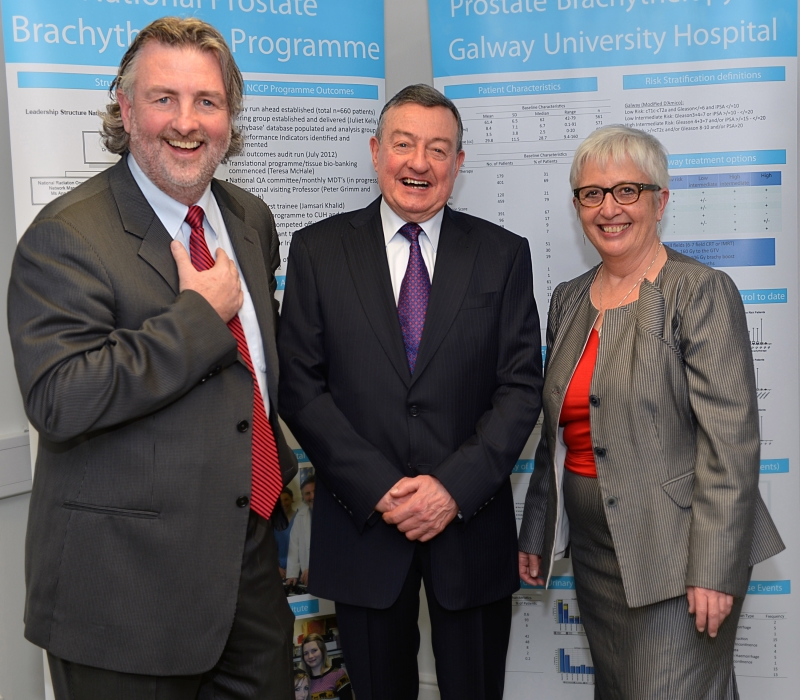You are here
National Cancer Control Programme launches National Prostate Brachytherapy Service

Prostate Cancer treatment to be significantly enhanced by new NCCP National Service
The National Cancer Control Programme launched a new national service for the treatment of prostate cancer yesterday, Monday 28 January. The NCCP National Prostate Brachytherapy Service provides patients with a once off treatment option that involves the implantation of radiotherapy seeds directly into the prostate as an alternative to conventional radiotherapy treatments.
The treatment has been available to patients in the west on a local basis for the past five years as a result of the innovation of Prof Frank Sullivan, Consultant Radiation Oncologist who has been successfully treating patients in Galway University Hospitals since 2007. Yesterday’s launch marked the expansion of the service and its establishment nationally, with the appointment of new consultants and investment in new equipment in St Luke’s Hospital Rathgar, Dublin and Cork University Hospital.
Ireland has the highest incidence of prostate cancer in Europe with over 3,000 men diagnosed annually. This number is expected to increase over the coming decades as the population ages. Considerable advances have been made in both the surgical and radiotherapy options in recent years. Brachytherapy has gained international acceptance as a standard of care in the management of the disease.
Prostate (Seed Implant) Brachytherapy is a technique to treat early stage, low risk prostate cancer by strategically placing radioactive seeds inside the prostate gland (using specialised equipment) where they remain to irradiate the malignant tissue within the prostate. For men who have been diagnosed with prostate cancer, the option of brachytherapy means just one visit to the cancer centre which is more convenient for patients who may otherwise require seven to eight weeks of daily external radiotherapy sessions or surgery. Some patients, with higher risk features, may need other additional treatments such as a short course of radiation and/or hormone therapy.
According to Prof Sullivan: “This is a very exciting development for prostate cancer services in Ireland and is particularly positive for our patients. Patients who are suitable for Prostate Brachytherapy benefit from high dose highly targeted radiation, shorter treatment times and studies are showing disease control rates equivalent to the other curative options, as well as improved quality of life for patients.
“In GUH we provide the full range of cancer treatments for patients with prostate cancer. Our Rapid Access Prostate Clinic has been hugely successful since its opening in 2009 and in 2010 the Prostate Cancer Clinic at NUI Galway was established to develop new therapies and better treatments. We are well placed to deliver the latest treatment in a region that has the highest incidence of the disease nationally.”
With the development by the National Cancer Control Programme of radiotherapy services nationally, a number of key Consultant appointments were made. Included in these were the appointments of Consultant Radiation Oncologists Gerard McVey in St Luke’s Hospital Rathgar and Paul Kelly in Cork University Hospital. The decision to develop a national brachytherapy service allowed for the harnessing of the expertise of these the two Consultants in their respective centres. A specialist training programme devised by the NCCP and led by Prof Frank Sullivan provided the necessary targeted skills to allow Mr Kelly and Mr McVey to deliver the new service in Cork and Dublin.
Bringing his own expertise and experience to this training process, Prof Sullivan played a pivotal role and the service now available in all three centres is delivered on a quality assured standardised basis with patients guaranteed to receive the same high standard of care and treatment regardless of their location.
The patients who are referred for this new national service will have already been seen in the NCCP Rapid Access Prostate Cancer Clinics established in all eight designated cancer centres over the past three years. These clinics are now successfully diagnosing patients in a targeted manner allowing for access to the concentration of expertise available in the designated centres.
A total of 2768 patients were seen in all eight Rapid Access Clinics last year with 1031 prostate cancers detected. As a result of this latest initiative, those patients who have had a prostate cancer diagnosis and are deemed suitable will have access to Prostate Seed Implant Brachytherapy as part of an overall treatment plan.
Over 100 men received the brachytherapy treatment in Galway University Hospitals last year, and as the service is rolled out nationally, it is anticipated that over 300 will be availing of prostate brachytherapy annually.
According to Dr Susan O’Reilly, National Director of the National Cancer Control Programme: “The National Cancer Control programme has had a strategic and operational focus on improving access to diagnosis and optimal therapies for men with prostate cancer nationwide.
“We have collaborated with the eight designated cancer centres to implement Prostate Cancer Rapid Access Clinics in 2010 and 2011. A total of 2466 patients were referred to these clinics according to NCCP guidelines in 2011 with 2768 referred last year. From these referrals a total of 925 cancers were detected in 2011 with that figure increasing to 1031 last year as the clinics were becoming fully operational.
“Now, men seen in these centres who have curable prostate cancer benefit from having multidisciplinary team input into their treatment plan and have options which span active surveillance, radical prostatectomy, external beam therapy and prostate brachytherapy. We are also pleased that the HSE has supported funding for new prostate cancer drugs such as Abiraterone (Zytiga) which were recommended by the NCCP Technology Review Committee.”
Acknowledging the significant role played by Professor Frank Sullivan, Dr O’Reilly said that: “Prof Sullivan and Galway University Hospital have led the way in the development and delivery of prostate brachytherapy for the curative treatment of this cancer. I am delighted that we now have these services available in Dublin and Cork, so that men have options wherever they live. Professor Sullivan and his team have provided the national leadership and training to implement these national services and they are to be congratulated and thanked for their significant innovation and contribution.”
Photo Details:
Prof Frank Sullivan, Consultant Radiation Oncologist and Lead Clinician, Department of Radiation Oncology, Galway University Hospitals (GUH); Peter Keane who received Prostate Brachytherapy treatment at GUH in 2010 and Dr Susan O’Reilly, National Director of the National Cancer Control Programme at the launch of the National Prostate Brachytherapy Service at GUH on Monday 28 January.

